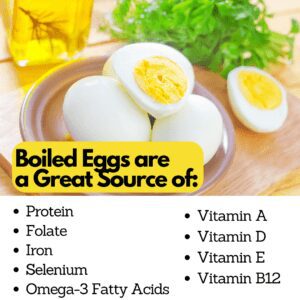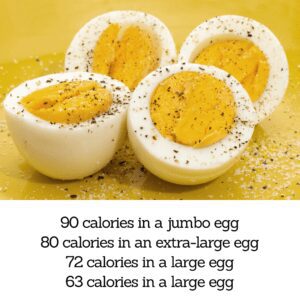How Many Calories Is In An Egg?
Egg Nutrition Facts: Boiled Eggs
Did you know that eggs are one of the most nutrient-rich foods on the planet?
In addition to being an excellent source of protein, eggs also contain a wealth of vitamins and minerals essential for good health.
But, how many calories are in eggs?
How many calories are in a Jumbo egg? There are about 90 calories in a jumbo egg.
How many calories are in an extra-large egg? There are about 80 calories in an extra-large egg.
How many calories are in a large egg? There are about 72 calories in a large egg.
How many calories are in a medium-sized egg? There are about 63 calories in a large egg.

Here’s what one reader had to say about what happened when she started eating eggs:
ReaderMail: I remember the day my husband told me that eggs were bad for me. I was so confused – I had always heard that they were a healthy breakfast option. But he swore up and down that they were terrible for you, and that I should avoid them at all costs.
I did some research of my own, and it turns out, he was wrong! Eggs are a great source of protein, vitamins, and minerals. So I decided to start eating four boiled eggs per day to see if there would be any changes in my waistline.
And sure enough, within just a few weeks of eating eggs every day, I could see a noticeable difference in my body shape. My waistline was noticeably tighter, and I felt more energetic overall. Thanks to eggs, I finally got the body I always wanted!
Let’s take a closer look at some of the key nutrients found in eggs.

1. Protein
A single large egg contains approximately 6.3 grams of protein. This includes all the essential amino acids your body needs to perform optimally.
Eggs are often referred to as “nature’s multivitamin” because they contain such a wide variety of vitamins and minerals.
Protein is good for you because it:
- Builds and repairs muscle tissue
- Aids in the production of hormones and enzymes
- Helps to transport oxygen and nutrients around the body
- Provides a feeling of fullness after eating
2. Vitamins
Eggs are an excellent source of vitamins A, D, E, and K.
Some of the most important vitamins and minerals found in eggs include:
2. Vitamin A
Eggs are an excellent source of vitamin A, which is important for vision, bone growth, reproduction, and cell division.
3. Vitamin D
Vitamin D is essential for bone health and it helps your body absorb calcium.
4. Vitamin E
Vitamin E is a powerful antioxidant that helps protect your cells from damage.
5. Vitamin B12
Vitamin B12 is essential for the proper function of your nervous system and red blood cells.
6. Folate
Folate is important for cellular growth and the development of the neural tube.
7. Iron
Iron is essential for the transport of oxygen in your blood and the proper function of your immune system.
8. Selenium
Selenium is a trace mineral that helps protect your cells from damage.
As you can see, eggs are truly a nutrient-rich food. Including eggs in your diet is a great way to ensure that you’re getting all the nutrients you need for good health.
Are The Fat Calories In Eggs Bad For You?

The fat content of eggs varies depending on the size of the egg. But, on average, a large egg contains about 5 grams of fat.
Are the fats in eggs healthy? Yes, the fats in eggs are healthy.
The majority of the fat in eggs is unsaturated fat, which is the type of fat that is good for your heart. In fact, studies have shown that eating eggs can actually help to improve your cholesterol levels.
Eggs also contain omega-3 fatty acids, which are important for various health benefits, including improved heart health and better cognitive function.
Whole Eggs Are an Excellent Source of Protein
Eggs are one of the few foods that contain all the essential amino acids your body needs.
Amino acids are the building blocks of protein and they are essential for many bodily functions, including muscle growth and repair, metabolism, and the production of hormones and enzymes.
Your body cannot produce essential amino acids on its own, so you must get them from your diet.
Eggs are an excellent source of protein and they are also very easy to digest. In fact, eggs are one of the few foods that are actually classified as a “complete protein”.
This means that they contain all the essential amino acids your body needs in the right proportions.
Are Egg Whites Good For You?

Egg whites are a great source of protein (they’re basically all-protein), and they are also low in fat and calories. They are a good choice if you are looking for a healthy, low-calorie snack.
That being said, I like to add at least one yolk per 6 egg whites that I eat because the yolk is where all the essential nutrients are found, such as vitamins A, D, E, and K.
It also contains important minerals like iron and zinc. The yolk also contains choline, which is important for healthy brain function.
Heart Disease Risk: Do Eggs Increase Heart Disease Possibility?
Eggs do not increase heart disease.
There is no evidence that eggs increase the risk of heart disease. The opposite may be true.
Studies have shown that eating eggs can improve your cholesterol levels and reduce your risk of heart disease.
Are Boiled Eggs Good For Weight Loss?
Yes, boiled eggs are a great staple food for folks trying to lose weight, or gain muscle. They’re a great source of protein, and they’re low in calories.
Plus, they’re easy to prepare and convenient to eat on the go.
Folks on a low-carb diet, or keto diet, typically enjoy boiled eggs as a snack or breakfast option because they are a great source of protein and healthy fats.
How Many Calories Are In A Boiled Egg?

The number of calories in a boiled egg is the same as if they’re uncooked. Check the graphic above for reference.
Do Boiled Eggs Make You Fat?
Boiled eggs can make you fat if you eat too many of them. Too many calories from any type of food can make you fat.
Now, “too many” calories depends on what your daily calorie goal is. If you’re trying to lose weight, you’ll want to eat fewer calories than you burn each day. And if you’re trying to gain muscle, you’ll need to eat more calories than you burn.
The number of calories in a boiled egg is relatively low, so as long as you don’t overdo it on the rest of your meals, they can be a part of a healthy weight-loss diet.
How Many Calories are in Fried Eggs?
There are about 190 calories in a typical serving of fried eggs. This number will vary depending on how the eggs are cooked and what type of oil is used.
For comparison, a boiled egg has about 80 calories. So, fried eggs are almost 2.5 times as high in calories.
Fried eggs are also higher in fat and cholesterol than boiled eggs.
So, if you’re trying to lose weight or improve your cholesterol levels, boiled eggs are a better choice.
For more info on eggs, check out the following articles:
Benefits of eggs for weight loss and more!
The benefits of protein for weight loss
